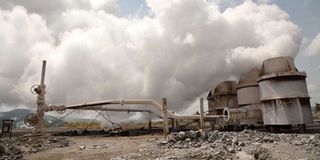Kenyans to stick with costly thermal power until 2035

Steam rises from a geothermal well at KenGen's Olkaria plant in Naivasha, Nakuru County, on June 19, 2020.
What you need to know:
- A listing of the active diesel-run power generators shows that the longest power purchase agreement runs until 2035, leaving consumers with a longer wait before the expensive energy sources end.
- On nuclear power, which the government is keen on establishing a plant despite opposition from environmentalists, the PS said it will enhance energy security for the country in the long-term.
Kenyans will continue paying more for power despite having a healthy source of clean energy, thanks to expensive thermal energy contracts.
Kenya relies on hydro, wind, solar and geothermal sources for its energy.
The government is also planning to set up a nuclear power plant despite resistance from environmentalists.
A similar plan to set up a coal plant was halted by the High Court last year.
According to Ministry of Energy principal secretary Eng Joseph Njoroge, Kenya has 2,044.51 MW (73 per cent), which is renewable while 746.73 MW (27 per cent) is thermal.
In 2013, Kenya had a mere 1,569 megawatts and had an ambitious programme to have 10,000 megawatts by 2020.
However, it has only added 1,221 megawatts since 2013 blaming lack of demand for power for slow progress in producing more.
But despite this progress, thermal power producers sell power to government at Sh18 per unit compared to clean energy, which sells at almost half the price. This is because Kenya is tied to them for up to 15 years.
A listing of the active diesel-run power generators shows that the longest power purchase agreement runs until 2035, leaving consumers with a longer wait before the expensive energy sources end.
Eight plants
Data from the Energy and Petroleum Regulatory Authority (Epra) shows that there are eight thermal power plants with a combined installed capacity of 746.73 megawatts supplying the national grid. Triumph Power Generating Company was the latest company to be signed for thermal power supply in July 2015.
The firm’s 83MW plant has a 20-year contract expiring in February 2035. Others like Coast–based Gulf Energy with 80MW and Thika Power with 90MW will expire in 2034.
Switching off thermal plants is part of the government's gradual phase-out plan of expensive diesel power generators as it moves to provide cheaper and cleaner energy.
Last year, Iberafrica’s 54MW thermal plant was dropped off the grid after 15 years with the expiry of its power purchase agreement. Energy Cabinet secretary Charles Keter has previously said that the option of waiting for the expiry of the production agreements would be the easiest as terminating them early would be costly.
The government says all is not gloom as it is now concentrating on clean power.
“Some 18 projects with a capacity of 1,051 MW have been commissioned since 2013. These are for geothermal, wind, solar, small hydro and biogas. There are other projects in the pipeline from various renewable sources,” said PS Njoroge.
He gave example of the 310 megawatts Lake Turkana Wind Power project where wind energy cushions the country against fluctuations in world crude oil prices as less thermal energy is required.
“Wind energy enables regulation of hydro energy usage in the major reservoirs such that the system is shielded against negative impacts of possible severe droughts. On the other hand, geothermal which provides a stable base load energy supply at low cost compared to thermal energy sources. The country has managed to avoid power rationing that was necessary during severe droughts. With green energy sources, the cost of electricity has been more stable as the fuel energy cost has been low and generally stable,” he said.
Nuclear power
On nuclear power, which the government is keen on establishing a plant despite opposition from environmentalists, the PS said it will enhance energy security for the country in the long-term.
“A diversified energy mix helps in enhancing the national energy security. Development of nuclear power is a long process that requires initiating capacity development much earlier.
“Thus, nuclear power projects have long lead times with some countries taking over 30 years. Capacity building towards development of nuclear energy began in 2011 and is ongoing,” he said.
In 2018, the government extended the lifeline tariff for domestic consumers from the recommended 15kWh consumption per month to 100kWh and also allowed the same for small commercial customers.
“A discount of 50 per cent was introduced for large consumers/manufacturers for power consumption during off-peak hours for all units consumed above their normal consumption during off-peak hours. Addition of renewable energy in the generation mix has enabled decrease of thermal dispatch and thus lowered pass through Fuel Cost charges,” said PS Njoroge.





